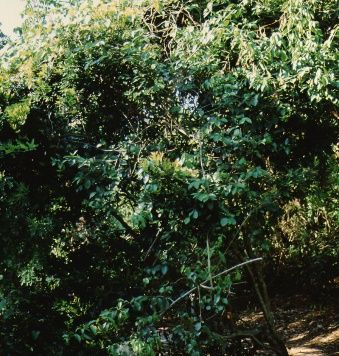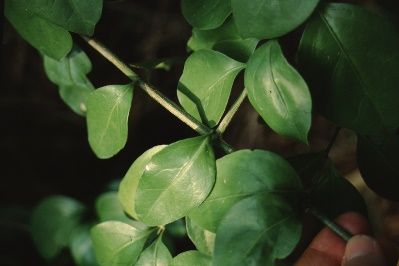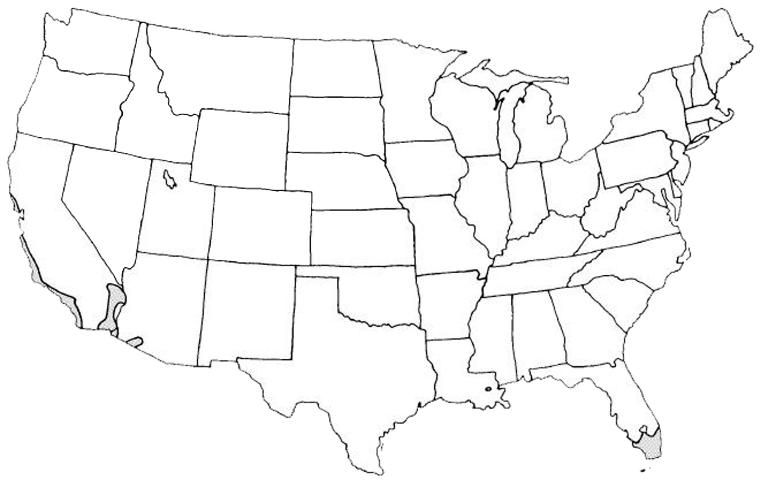Introduction
Chiococca alba is a handsome, low scrambling shrub that can reach a height of 10 feet if given a support to climb upon (Figure 1). The leathery leaves of the snowberry are evergreen, shiny, and dark green in color. White to yellowish, tubular flowers are found in the leaf axil and occur in 3-inch-long racemes or panicles. Each raceme or panicle is tipped with 6 to 8 of the flowers, and these flowers turn from white to yellow with time. The common name used for this shrub refers to the large, ovoid, sparkling white fruits that follow the delightful flowers. This plant may be used as a mounding specimen and is a splendid trellis or espalier subject.

Credit: Edward F. Gilman

Credit: Edward F. Gilman
General Information
Scientific name: Chiococca alba
Pronunciation: kye-oh-KOE-kuh AL-buh
Common name(s): snowberry, milkberry, West Indian milkberry
Family: Rubiaceae
Plant type: vine
USDA hardiness zones: 10 through 11 (Figure 3)
Planting month for zone 10 and 11: year round
Origin: native to Florida
Invasive potential: not known to be invasive
Uses: espalier; mass planting; foundation
Availability: somewhat available, may have to go out of the region to find the plant

Credit: undefined
Description
Height: depends upon supporting structure
Spread: 6 to 10 feet
Plant habit: spreading; round
Plant density: open
Growth rate: moderate
Texture: medium
Foliage
Leaf arrangement: opposite/subopposite
Leaf type: simple
Leaf margin: entire
Leaf shape: ovate
Leaf venation: pinnate
Leaf type and persistence: evergreen
Leaf blade length: 2 to 4 inches
Leaf color: green
Fall color: no fall color change
Fall characteristic: not showy
Flower
Flower color: yellow
Flower characteristic: flowers periodically throughout the year
Fruit
Fruit shape: round
Fruit length: less than .5 inch
Fruit cover: fleshy
Fruit color: white
Fruit characteristic: attracts birds
Trunk and Branches
Trunk/bark/branches: typically multi-trunked or clumping stems; not particularly showy
Current year stem/twig color: green
Current year stem/twig thickness: thin
Culture
Light requirement: plant grows in part shade/part sun
Soil tolerances: acidic; alkaline; sand; loam
Drought tolerance: high
Soil salt tolerances: unknown
Plant spacing: 36 to 60 inches
Other
Roots: usually not a problem
Winter interest: no special winter interest
Outstanding plant: not particularly outstanding
Pest resistance: no serious pests are normally seen on the plant
Use and Management
The snowberry is a shrub that needs a sunny location and well-drained soil. It will grow well on sandy loam soils and can tolerate dry conditions. This plant can be found in or near coastal areas throughout Florida and will usually survive without care.
Pests and Diseases
Chewing insects may occasionally be a problem for Chiococca alba, but none are lethal.